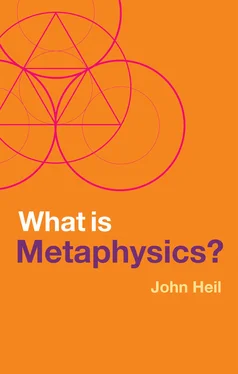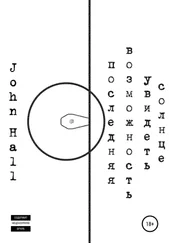John Heil
Melbourne
July 2020
What is Metaphysics? took shape in Melbourne during my tenure as a Fulbright Fellow in the first half of 2020. I am much indebted to the Australian–American Fulbright Commission and to Monash University, my host institution, for their support. The Fellowship, which was meant to run from mid-February through June, was cut short by the onset of the Covid-19 pandemic, but I remained in Australia with my wife, Harrison, and continued working from our adopted home in Caulfield South thanks to the graciousness of Marie-Thérèse Jensen. My stay at Monash would not have been possible without the support of Christina Twomey, Head of the School of Philosophical, Historical, and International Studies; Jakob Hohwy, Head, Department of Philosophy; and Jessica Weijers, School Manager, who deserves a gold parking pass.
I would not be the philosopher I am, and this book would not have been the book it is, had I not enjoyed the company of ten philosophers who are no longer around to read these words: David Armstrong, Donald Davidson, Fred Dretske, J. J. Gibson (whom I count as a philosopher), Jonathan Lowe, Charlie Martin, Norman Malcolm, Hugh Mellor, Mark Overvold, and Jack Smart.
Keith Campbell and John Bigelow, both important figures in Australian philosophy, have continued to exert a powerful gravitational pull on my thoughts, although not always in the same direction. I have also been influenced at close range by Jonathan Bennett, Alex Carruth, Randolph Clarke, Heather Dyke, Anthony Fisher, Frank Jackson, Jaegwon Kim, Anna Marmodoro, Yitzhak Melamed, Elizabeth Miller, Gonzalo Rodriguez-Pereyra, Peter Simons, Roy Sorensen, Galen Strawson, and Peter van Inwagen. I am most grateful to four anonymous readers who provided insightful advice and managed to convince me to temper my worst instincts, and to Ian Tuttle for finding and correcting numerous gaffes and infelicities. Harrison Hagan Heil suffered through successive versions of the book, offered invaluable counsel, and, more than anyone else, helped shape its character.
Pascal Porcheron, my editor at Polity Press, encouraged me to persevere in the project that resulted in this book. An old adage has it that the best way to learn something is to teach it. To the extent that this is true, it is true because you do not fully understand something until you can explain it to yourself, a prerequisite for teaching it to others. Writing this book afforded me the rare opportunity to do both, and for that I am especially grateful to Pascal and to Polity Press.
1 Introduction
1.0 Metaphysics Is . . . What?
This book is addressed to readers curious about metaphysics. Today, purveyors of serious metaphysics reside in university philosophy departments, or, at any rate, would have spent time in academic settings. The book’s aim, however, is to convince you that, far from being an effete academic pastime, metaphysics is inevitable. Each of us embraces metaphysical theses, often without recognizing them as such. Philosophers are not the only philosophers. What distinguishes card-carrying, capital-P Philosophers from everyone else is just that the Philosophers embrace metaphysical doctrines self-consciously.
Readers whose impressions of metaphysics stem from acquaintance with books featured on popular bookstore shelves bearing the label might have a somewhat different view of the subject. For those readers, metaphysics is likely to exude an aura of mysticism or maybe thoughts of tarot cards and astrological readings, coupled with a measure of unconstrained speculation. If, in picking up this book, this is what you were expecting, you might be alarmed – or relieved – to learn that the metaphysics to be discussed here comports with both hard-edged science and everyday experience. The Australians call this ontologically serious metaphysics.
So conceived, metaphysics has a long history, and a much longer prehistory. This is not a historical survey, however, but a foray into a subject matter that runs the historical gamut. One underlying theme is that, whether anyone likes it or not, metaphysics is pervasive. Self-proclaimed skeptics who dismiss metaphysics as a frivolous waste of time most often do so on the basis of unexamined metaphysical commitments of their own, commitments unlikely to survive honest scrutiny.
I will try to convince you of metaphysics’ inevitability, not by argument, but, starting with this chapter, by example. Because the book is meant to draw in nonspecialists, its focus will be on broad theses and suggestive arguments, rather than on the fine-grained details of these theses and arguments. This is not a matter of dumbing down the subject. The Devil is in the details, but the chief interest in, and significance of, metaphysics lies less in the details than in the extent to which metaphysics provides satisfying proposals for solutions to issues that lie just below the surface of everyday life, the arts, and the sciences.
You might think that the place to begin would be with a definition of “metaphysics,” a succinct characterization that would give you some idea of what you are in for. Would that it were so. Definitions of subjects – mathematics, psychology, poetry, for instance – rarely assist those looking for help in discerning the nature of the subject matter. To the extent that they are intelligible to the nonspecialist, definitions tend to be vague and impressionistic. Psychology is the study of human behavior. Yes, but how does this distinguish psychology from biology, anthropology, or marketing? When precise definitions are available, they are most often of interest only to those already familiar with the subject.
I could tell you that metaphysics is the study of being or the nature of reality, but that does not set metaphysics off from hosts of other subjects including, but not limited to, the sciences. I could tell you that metaphysics provides our most general characterization of what there is, leaving more specific characterizations to the various sciences. But again, this does little to distinguish metaphysics from physics, the most general of the sciences.
Some suppose that metaphysics is distinguished from the sciences in being a priori: metaphysics endeavors to derive truths about reality from truths that require no further warrant, truths that are self-evident. If you want a model, think of Euclidean geometry in which theorems are deduced from a small number of axioms purporting to be self-evident. Physics, in contrast, like the other sciences, relies on a posteriori reasoning that begins and ends with empirical observation and investigation.
As the example of Euclidean geometry suggests, however, characterizing metaphysics as relying exclusively on reason would fail to distinguish metaphysics from mathematics. Mathematics is essential to the sciences, but unlike metaphysics, it has no worldly pretenses. Its utility depends not on its capturing truths about reality, but in description and calculation. In its simplest form, calculation takes, as inputs, truths or purported truths, and yields outputs that must be true if the inputs are true.
In putting it this way, I am skating over scores of important features of mathematics. My aim is not to show how or why mathematics works, however, but only to note that, if metaphysics were a priori it would be in good company.
But is metaphysics a priori? Not by my lights. Although metaphysics does not compete with the sciences – or, for that matter, with poetry or fiction – metaphysics seeks to provide a systematic account of categories indispensable to any endeavor to say what there is, and that is not something that could be arrived at by reason alone.
Читать дальше












